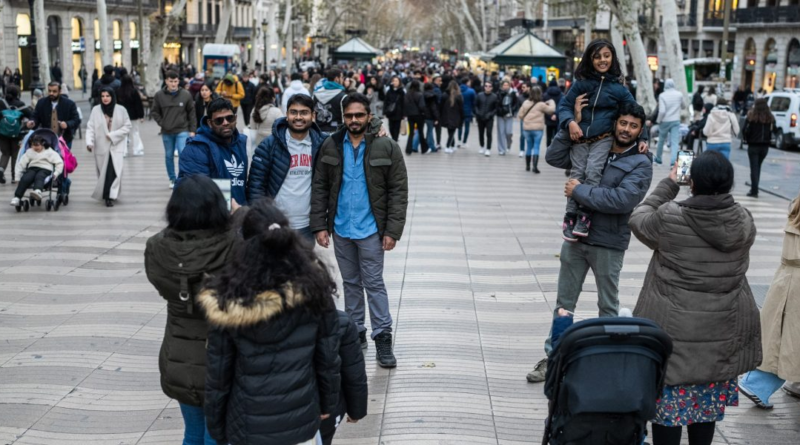European tourist hotspot wants to make visitors less annoying to locals by having them buy heat pumps and solar panels for area schools
One of Europe’s top travel destinations doesn’t like tourists — or at least you’d get that impression reading some of the unwelcoming slogans locals have graffitied across Barcelona.
The city now has a plan that could curb some of this tourism phobia, while also helping with adaptation to climate change.
Barcelona’s city hall launched a new strategy to direct €100 million ($108 million) from its tourist tax – the charge travelers see at the bottom of their hotel bill — to a fund that will install heat pumps and solar panels in state-owned schools.
Using this tax for clear, long-term green benefits could change the perception of the disruption caused by the city’s guests. Barcelona, the home of 1.6 million people, every year hosts about 7 million tourists, who add pressure to already strained services, such as waste removal. To deal with that, local authorities have charged a tourist tax of €2.75 ($3) per person, for every night spent in the city, and will increase that to €3.25 ($4) from April 1.
“So far we have spent these taxes on compensating the impact tourists have on the city, including cleaning services, safety and public transport,” says Jordi Valls, Barcelona’s head of economic and tourism promotion. “This year we’ve decided to go a step further and spend the tax on financing public services from a climate point of view.”
Nestled on the Mediterranean shore, Barcelona’s climate is changing fast as the world warms. The city has become hotter and drier in recent years, with authorities declaring a state of emergency for water earlier this month amid a three-year drought that’s the worst on record.
High temperatures and longer heat waves have forced city hall to set up climate refuges where people can cool off in July and August. But increasing heat during school terms in June and September are making children — and the classrooms they spend so much time in — a new focus.
With the tourist tax fund, Barcelona expects to install air conditioning systems powered by rooftop solar on a total of 170 schools by 2029. When possible, old and polluting gas boilers will be replaced with heat pumps.
“Climate change is impacting our children and our schools — our infrastructure – is just not appropriate anymore,” Valls says. “The school project substantially improves education as a public service, while reducing carbon dioxide emissions.”
Authorities are planning to roll out 181,000 square meters (1.9 million square feet) of solar panels across school properties. As this will likely produce more power than these facilities need, officials want neighbors and other nearby public buildings to use that surplus, lowering electricity costs and providing clean energy for them too.
Barcelona’s plan could provide a blueprint for other European cities that are also dealing with climate change and a boom in visitors. In Italy, Venice collected €37 million in overnight tourist taxes in 2023, with hotels charging guests anywhere between €1 and €5. For now, current legislation forces the city to invest these funds in services and projects directly and indirectly linked to tourism, including security staff patrolling the city center, which is stormed every day by thousands of tourists.
Venice’s tourist tax also contributes to traditional cultural events, such as the Festa del Redentore in July, when a variety of boats parade Saint Mark’s basin, as well as preservation of the environmental and artistic heritage of the city, such as the iconic La Fenice Opera House and Teatro Goldoni.
Since day-trippers don’t pay the existing overnight tourist tax, starting on April 25 the city will charge them a new €5 daytime levy during the busiest days in spring and summer. The entry fee is aimed at reducing the downsides of mass tourism and helping to preserve the city’s heritage.
“In 2025 we plan to use part of the funds to reduce the waste tax for residents, which is very high because of the high number of tourists coming here every day,” says Michele Zuin, budget counselor for the city. “The rest of the sum will be used for maintenance works all over Venice.”
Paris, Europe’s most visited city, increased its overnight tax for tourists staying in the wider Île de France region by 200% as of Jan. 1. The hike means visitors staying in one-star hotels now pay €2.60 per night, while those staying in ritzier digs pay €14.95 per night, compared to 0.80 cents and €4.60, respectively, prior to the change.
The government is expecting to collect way more than the €200 million needed this year for transportation upgrades, such as several extensions of metro and train lines, ahead of the 2024 Summer Olympics, which is being promoted as the greenest games yet. It also aims to set aside around €11 million for creating and maintaining green spaces.
Meanwhile, back in Barcelona, not everyone is convinced the new plans for the tourist tax are going far enough to offset the impacts of extra visitors.
A lot more could be done with the millions of euros tourists pour into the city every year, says Janet Sanz, a member of city council and the vice president for climate action in the Barcelona Metropolitan Area. A significant chunk of the tax is still spent on promoting the city through tourism fairs and events and money, she says, would be better spent on new bike lanes and the expansion of green areas.
“There’s no need to promote such a well-known city,” Sanz says. “Everyone wants to live the ‘Barcelona experience.’”




